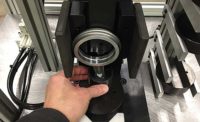WEST LAFAYETTE, IN-Commercial airliners have up to a million rivets, some of which are inevitably created with imperfections that make them susceptible to corrosion, leading to cracks that can result in serious failures. This is the case whether the rivets are installed manually or by automated machines.
Identifying flawed rivets has historically been extremely difficult. But researchers at Purdue University, working in concert with the U.S. Air Force, recently unveiled a system for tracking rivet quality by using sensors attached to the guns installing the rivet. Findings about the method were detailed in a paper presented July 7 during the Second European Workshop on Structural Health Monitoring in Munich, Germany.
As larger commercial aircraft are being built, the ability to monitor the quality of rivets is becoming increasingly important, says Douglas Adams, an assistant professor of mechanical engineering at Purdue University. "One of the great challenges when you've got something with a million rivets is how in the world do you identify the bad ones?" he says, adding that the business of catching flawed rivets should not be left up to visual inspections and other conventional methods.
The Purdue researchers have shown how to use a rivet gun equipped with sensors called accelerometers to monitor the riveting process. As each rivet is created, a computer stores all relevant data regarding its quality. This data can then be used to make a map showing where the sub-par rivets are located.
"Corrosion and corrosion-fatigue cracks emanate from fastener holes and, therefore, are dominant problems in the aircraft industry," says Kumar Jata, a technical adviser in the Metals, Ceramics and Nondestructive Evaluation Division of the Materials and Manufacturing Directorate at Wright-Patterson Air Force Base in Ohio. "If the rivets are loose, for instance, your structure is going to start rattling. You don't want that because you are causing fatigue."
As cracks develop and grow, they eventually link up and can cause catastrophic accidents in which the fuselage loses its strength and gives way, he says.
For more information on rivet gun sensors and rivet quality call 765-496-6033 or visit www.uns.purdue.edu.



